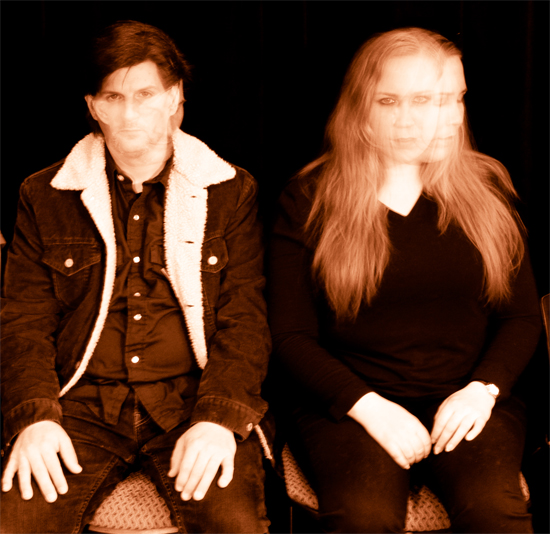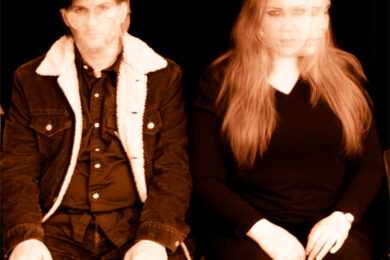Just as the late 80s grunge explosion glanced the edges of raw noise and damaged, sonic rheumatism via bubblegum pop and themes of spiritual malaise, doom metal plunged itself axe-first into murkier bowels of amplification, ousting traditional song sensibilities for extended explorations and using noise as its primary narrative. The rougher edges of live guitar performance – stabs of unholy feedback, sternum-pumping gusts of resonant frequency and discordance – became unlikely instruments of choice for post-pubescent greasers of various international pockets. It was, of course, over 20 years since Derek Bailey twanged his first dissonant chord to wax, 15 since Glenn Branca melted the pickups off his Telecaster and a decade after Keith Levene raised shrieking hell with Flowers of Romance, but no other movement attacked a specific register – a foreboding, unforgiving six string drone – with such focused, guttural violence.
Earth, a mucky, plaid-adorned ensemble of Melvins-inspired twenteens came to cast this idea in stone with 1991’s Extra-Capsular Extraction. Thick, black tides of low-end demonic riffage flowed like an oil slick, bruising oceans of sound and surfacing only occasionally for air. Space and thought emerged deep within the slick, as textures mixed, twirled and transformed in subtle and unnerving ways like the dull formation of a raincloud. Its chief creator, Dylan Carlson, remains at the helm of a densely evolved vessel: The newer material retains the very basic tenants of 1991’s drone metal compendium, but exhibits them in less gargantuan ways. Instead, Carlson’s increasing love of folk and country music sideline any obvious fuzz. As Sunn O))), former Earth tribute act-come-doom contemporaries, crawl deeper into the murk via Attila Csihar’s baritone and various live synthesizer quests, Earth demonise their sound through Ry Cooder riff repetitions, string instrumentation and shuddering drum patterns.
I spend roughly half an hour trying to ring Carlson at his base in Seattle. For most of this painstaking, panic-stricken period I wondered why I am cursed in such frivolous ways – after it, I couldn’t remember why I worried so much. When I finally get through, I’m struck immediately by the tone, pace and atmosphere of his voice. He discusses matters in such a slow, deep, barely-there crackle it quickly comes to resemble the music he used to make. Just when you think it’s your turn to speak, you realise he’s hardly half-way through his thoughts and when you do, you can’t bear but delineate over words in a similar way. Our conversation, though fairly brief, avoided grappling at incidents long past – no talk of Kurt Cobain’s death, that documentary, or heroin – but instead remained rooted, remorselessly, in the here and now. It soon became clear, after all, that Carlson is as-we-speak dealing with too many problems to begin discussing old ones. His health, more than anything, rapidly deteriorated last year, threatening not only the release of Earth’s sixth and newest long player, Angels of Darkness, Demons of Light 1, but his future as a touring musician.
The new album, the first of two parts, has a hint of conceptualism; and not merely in its title. Can you clear this up?
Dylan Carlson: Sure. I guess once again it’s to do with conflict and opposites. As I get older, I’ve started to reject the simplicity of reason and rationality. The album’s about the conflict I have with my understanding of the world. It’s going to sound cheesy, but I’ve developed an interest in fairy tales and fantasy novels. There’s a conflict in them that I like – a power struggle between good and evil, between basic human rationality and spirituality. There’s one in particular called The Fairy Faith in Celtic Countries. Another is Jonathan Strange & Mr Norrell. I like the concept of it – these fusty old Englishmen who have dedicated their lives to practical magic, only to discover the wonders of nature later in life. They’ve spent so long obsessing over one thing they’ve missed out on everything else, haha. This is an important theme for me right now. I’ve always liked meeting people who obsess over one particular thing, but the novel started opening my mind to new possibilities. I like the descriptions, too – that everything has a language to it; the trees, water; everything in nature.
There’s a mournful quality to the album, more so than 2008’s The Bees Made Honey in the Lion’s Skull. Was this an intentional shift?
DC: Well, it’s informed by a few things really. I agree it’s more mournful, but I’ve been listening to a lot of folk. Fairport Convention have been a huge influence on my newer work, really. I wanted a more improvised writing and recording process for it, too. The title track was completely improvised, for example. Other songs were more managed, but in general writing took place in the studio.
I’ve also had some bad news about my health, so that may have given the mournful vibe a helping hand. A few days before we went on a two week mini-tour to support the new material, I was diagnosed with hepatitis B and liver damage. My doctor told me not to go on the road. I’m starting to recover now though, getting the right treatment. But it may well have imbued the record with a certain something; we started it three or so weeks after I found out. To be honest, I thought it might be our last, so I wanted something to show for our career. In a way, the record brings together everything we’ve done to date.
Keeping on the topic of influences, are there any newer artists that excite you?
DC: Well, there’s a few. I’m more excited by the prospect of true melody than simply chord progressions. To create a subtle melody is something I respect and constantly strive to achieve. This is exactly how I’d describe the new work: Much more than The Bees Made… which was concerned with overdubbing and structuring, we’ve created something out of nothing, really. An organic, composed chemistry between the four of us. Someone once said to me that with Earth it’s like music they thought they’d already heard. It was one of the biggest compliments I’ve ever had; the idea that simple riffs can bring with them a sense of nostalgia, that melodies can help you remember important things. There’s an intrinsic value in melodic music.
In terms of newer bands, I like the new Rose Kemp record. I like Mount Eerie’s stuff. There’s this African band too, Tinariwen. It sounds like half of them play guitar. I like that, haha.
Odd uses of drone in Mount Eerie’s stuff, especially in The Microphones days…
DC: Yeah, definitely.
I know you’ve had a few issues with Southern Lord about the release date for the second part. Is it confirmed now?
DC: Yeah, I wanted it [Angels part 2] to come out in September), but because of certain issues at the label it isn’t coming out until next year now. Kind of frustrating, because it messes with the continuity a bit, but these things happen.
Was the collaboration line-up affected drastically for the album?
DC: Yeah, a few nice slots here and there. We brought in some musicians that were found elsewhere. Steve (Moore, Hammond organ, piano) tours with a few other bands. He recommended Lori (Goldston) to us, who plays cello (she was part of the line-up for Nirvana’s MTV Unplugged in New York performance). I instantly loved her playing style. She improvises a lot, and plays it in a rocky style. She brings a lot to the record, and kind of understood what we were after from the start. I’ve always loved the sound of a cello, anyway. Another was Angelina Baldoz, Lori’s friend and our newest bass player.
Whose work is it on the cover?
DC: An artist called Stacey Rosich, who Karl (Blau, multi-instrumentalist) told me about – she did a flyer for him once. I checked out her website and instantly liked what I saw. She has a demonic obsession – fixated with the devil, hell, purgatory. We gave her a copy of the album and she did covers for both parts. She’s also a treasure in that she works really quickly. Artists are notoriously slow, so that was refreshing.
In the past you’ve mentioned your preference for analogue sound, for wax records over CDs and digital forms. You’ve mentioned a shift in theme, performance and recording style for the record, honouring this. Why, then, did you decide to remaster tracks from Extra-Capsular…?
DC: Well, it was a mixture of reasons. Primarily, it was a way of thanking fans for their patience – it’s been a while since our last record (A Bureaucratic Desire for Extra-Capsular Extraction was released last year). We remastered it because we hadn’t mastered it in the first place. The two that were released on Sub Pop were the only mastered mixes (referring to Extra-Capsular Extraction and their first full-length, Earth 2 ), everything else we recorded around that time were bootlegs. Younger fans were coming to our shows expecting to find older material to buy, and were going away empty-handed. It became apparent that half our audience only knew half the material, from Hex (…Or Printing in the Infernal Method) onwards. It was nice to give them something back.
How did was the writing process affected by your change in approach?
DC: Well, it depended really. Me and Adrienne (Davies, Earth’s drummer and Carlson’s partner) would work on riffs together, as usual. Sometimes we’d work at them on the road. Every early live performances of the songs would alter their structure, and I liked that organic process. Other times we would all just improvise in the studio just to see where it took us.
I’m planning on recording a solo album, actually. Just me and an acoustic guitar, nothing else. As a guitarist, I’m sort of retarded, so I’m not too sure I can make it work on my own. I’ve been building it up in my head for years, though. I’ve got all these grand ideas about it – I want it to make a big impact. It may be that I get lots of people thinking I’ve finally lost the plot, though!
With the new line-up, how do you think the live set-up will evolve with the new material?
DC: Well, nothing’s planned really, so it won’t be anything drastically different. We’ll obviously be doing some pieces from the new album and mixing them with older things, so it’s more a case of blending the sounds. We want to resurrect some ancient stuff as well, it might be fun. We’ll be touring the UK and Europe in April and May, so you can hear for yourself…
Angels of Darkness, Demons of Light is out on Southern Lord Records this week



